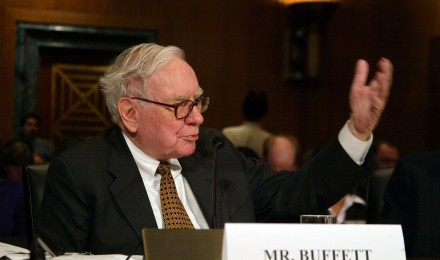A single highly successful investor such as billionaire Warren Buffett would be a welcome addition to your financial advisors. An entire team of such people would be even better.
So imagine yourself going to their plush offices high above the city, and relaxing on their comfortable couch as a secretary pours you a vodka tonic. “Would you like our own free credit cards? How about theatre tickets for tonight? Or a great meal at K” (the area’s hottest and hardest-go-get-a reservation restaurant)?”
You are introduced to the “team” that will help you. All have different areas of expertise.
But you are worth it. You have a net worth of at least $10 million.
Oh, wait a minute. You don’t have that kind of money.
Dream on, of course, but the cruel reality is that most of us don’t have that kind of income to take advantage of what has become the standard of financial advisors: a team of experts. So how do we find low-cost, but high-quality financial services – especially if we don’t have a high net worth?
Believe it or not, chances are better than ever that you can find it. And afford it.
Individuals have a much larger range of advisory choices than ever before, according to market analysts.. That’s due in large part to competition and the general growth of the investment market.
One option is close to home. At your work. Many employers who sponsor retirement plans offer free or discounted advice from the plan’s providers. If you don’t have access to cheap advice at work, you can always hire reasonably priced help.
Some financial advisors will create a basic financial plan and suggest portfolio allocations for a flat fee of less than $1,000. Advisors don’t do this out of the goodness of the hearts, however, but they want to build relationships with clients.
Some may also agree to work on an hourly fee basis ($150 to $300 an hour is a not un-typical rate) or on a flat-fee-per-project basis.
A fee structure arrangement might suit you better. But be aware it will cost you about 1 to 2 percent of your portfolio to oversee it. But that’s reasonable if you are getting results.
If you invest in funds—as most people with smaller portfolios do—you also need to know that will have to pay the funds’ expenses. These can range from less than 0.25% for some index mutual funds and exchange-traded funds to 1% to 2% for some actively managed funds.
Where to go to find financial advisors? Websites such as the Financial Planning Association, the National Association of Personal Financial Advisors or the Alliance of Cambridge Advisors are generally recommended. Another option is Garrett Planning Network (a network of fee-only advisers who charge by the hour).
Discount brokerage firms, which have long served do-it-yourself investors, also now regularly provide financial advice and portfolio-management services, too.
The disadvantages of low cost: if you opt for it: you will not have the luxury of calling someone else for reassurance. But if you are successful enough (with someone else’s help) financially, there are always those teams of advisors in cushy offices who are willing to help you because you can now afford them.
A single highly successful investor such as billionaire Warren Buffett would be a welcome addition to your financial advisors. An entire team of such people would be even better.
So imagine yourself going to their plush offices high above the city, and relaxing on their comfortable couch as a secretary pours you a vodka tonic. “Would you like our own free credit cards? How about theatre tickets for tonight? Or a great meal at K” (the area’s hottest and hardest-go-get-a reservation restaurant)?”
You are introduced to the “team” that will help you. All have different areas of expertise.
But you are worth it. You have a net worth of at least $10 million.
Oh, wait a minute. You don’t have that kind of money.
Dream on, of course, but the cruel reality is that most of us don’t have that kind of income to take advantage of what has become the standard of financial advisors: a team of experts. So how do we find low-cost, but high-quality financial services – especially if we don’t have a high net worth?
Believe it or not, chances are better than ever that you can find it. And afford it.
Individuals have a much larger range of advisory choices than ever before, according to market analysts.. That’s due in large part to competition and the general growth of the investment market.
One option is close to home. At your work. Many employers who sponsor retirement plans offer free or discounted advice from the plan’s providers. If you don’t have access to cheap advice at work, you can always hire reasonably priced help.
Some financial advisors will create a basic financial plan and suggest portfolio allocations for a flat fee of less than $1,000. Advisors don’t do this out of the goodness of the hearts, however, but they want to build relationships with clients.
Some may also agree to work on an hourly fee basis ($150 to $300 an hour is a not un-typical rate) or on a flat-fee-per-project basis.
A fee structure arrangement might suit you better. But be aware it will cost you about 1 to 2 percent of your portfolio to oversee it. But that’s reasonable if you are getting results.
If you invest in funds—as most people with smaller portfolios do—you also need to know that will have to pay the funds’ expenses. These can range from less than 0.25% for some index mutual funds and exchange-traded funds to 1% to 2% for some actively managed funds.
Where to go to find financial advisors? Websites such as the Financial Planning Association, the National Association of Personal Financial Advisors or the Alliance of Cambridge Advisors are generally recommended. Another option is Garrett Planning Network (a network of fee-only advisers who charge by the hour).
Discount brokerage firms, which have long served do-it-yourself investors, also now regularly provide financial advice and portfolio-management services, too.
The disadvantages of low cost: if you opt for it: you will not have the luxury of calling someone else for reassurance. But if you are successful enough (with someone else’s help) financially, there are always those teams of advisors in cushy offices who are willing to help you because you can now afford them.






